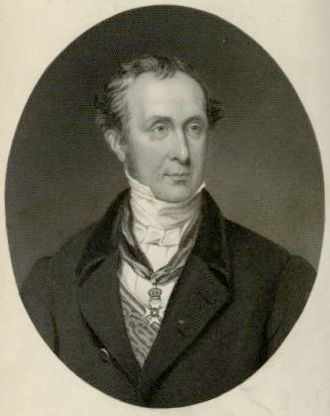
Chapter 5 of Hell and the High Schools (1923), T. T. (the initials are for Thomas Theodore) Martin’s unforgettably titled indictment of the teaching of evolution, is “Evolution Repudiated by Great Scientists and Scholars.” It contains, as is usual in creationist books of the Scopes era, a bunch of misquoted, misattributed, and misinterpreted passages, relieved only by the occasional expression of editorial opinion. Catching my eye, in part because it was underlined in the copy I have been reading, was the name of “Sir Roredick Murchison”—a typographical error, obviously, for Sir Roderick Murchison (above; 1792–1871), the Scottish geologist who established the Silurian geologic period, now dated to 443 to 419 million years ago, in his book The Silurian System (1839). According to Martin, Murchison wrote, “I know as much of nature in her geologic ages as any living man, and I fearlessly say that our geologic record does not afford one syllable of evidence in support of Darwin’s theory.”
Martin provides references for a few of the passages he quotes, but not for the Murchison passage. Years of experience have taught me to look for the initial appearance of such passages in Luther Tracy Townsend’s Collapse of Evolution (1905), which, as Ronald L. Numbers notes in The Creationists (1992), “assembled one of the earliest—and most frequently cribbed—lists in order to prove that ‘the most thorough scholars, the world’s ablest philosophers and scientists, with few exceptions, are not supporters, but assailants of evolution.’” But Townsend let me down. Fortunately, I am not without further resources. Among them is The Other Side of Evolution: An Examination of its Evidences (1903), by Alexander Patterson (1844–1912), a Presbyterian minister in the Chicago area. Martin lists The Other Side of Evolution second (after McCann’s God—or Gorilla) in his bibliography of “Books Exposing Evolution,” describing it as a “powerful, convincing book.” And it quotes the Murchison passage just as Martin quoted it.
Investigating further, I found that Patterson quoted the passage in The Greater Life and Work of Christ: As Revealed in Scripture, Man, and Nature (1896) in almost the same way, except with a reference to nature’s “geologic era” rather than nature’s “geologic ages.” After that, the trail seemed to grow cold. But I knew enough about Murchison to suspect that there was perhaps a grain of truth here. In his article on Murchison for the Complete Dictionary of Scientific Biography (2008), M. J. S. Rudwick notes, “From the 1840’s Murchison became increasingly rigid and intolerant of scientific innovation…He was totally opposed to Darwin’s evolutionary theory.” In a letter in late 1859 reacting to “the apparition of Darwin’s book on the ‘Origin of Species,’” Murchison wrote, “I am decidedly hostile to the whole thing, & am as firmly a believer as ever in Successive Creations” (emphasis in original). So it wouldn’t have been entirely surprising if Murchison indeed said something along the lines suggested by Martin and Patterson.
And so it was not with a huge amount of surprise that I found him doing so. In Archibald Geikie’s Life of Sir Roderick I. Murchison (1875), a passage is quoted from a letter (for which no date is provided) from Murchison to William Denison (1804–1871, a former governor-general of Australia and a governor of Madras who shared Murchison’s antipathy to evolution): “I flatter myself that I have seen as much of nature in her old moods as any living man, and I fearlessly say that our geological record does not afford one scintilla of evidence to support Darwin’s theory.” Words that appear in the passage ascribed to Murchison in Patterson’s books have been set here in boldface; it’s evident that the unusual phrases “old moods” and “scintilla” were replaced with the comparatively common phrases “geologic ages” (or “era”) and “syllable,” while the remaining differences are mainly stylistic. The divergences are doubtless merely due to sloppiness in memory or transcription.
Patterson, and following him, Martin, was guilty of sloppiness, but both were also guilty of anachronism. It isn’t clear from Geikie’s Life, and I wasn’t able otherwise to determine, when Murchison delivered himself of his opinion, but it was no later than the date of his death, obviously: so at least thirty-two years before the publication of The Other Side of Evolution and fifty-two years before the publication of Hell and the High Schools. Murchison wasn’t exactly at the leading edge of geology in 1871, and the discipline continued to progress after his death. Indeed, even in 1875, his biographer was a little embarrassed for him. Just before quoting the letter to Denison, Geikie (himself a famous geologist) explains that while Murchison was publicly quiet about his “repugnance” to evolution, “[h]is sentiments, however, used to be pretty freely expressed in conversation and in letters to his friends. A few extracts will show the kind of argumentation which he thought so formidable to the Evolutionists”—which he thought so formidable.

